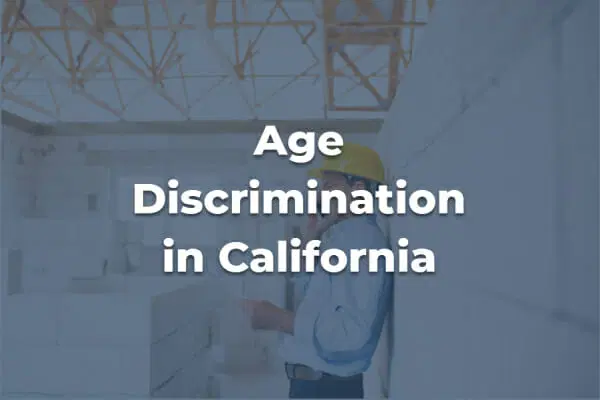
What Age Discrimination is & Is Not in California
Legally reviewed by: Jessica Anvar Stotz, JD, MBA
Short Answer: In California, age discrimination laws protect individuals age 40 and older from being treated unfavorably due to their age when it comes to employment, housing, and obtaining services.
Younger individuals under age 40 are not protected by California’s age discrimination statutes, though other laws may prohibit discrimination against minors in certain situations.
What Age Discrimination is and is Not in California
Here is a summary of what constitutes age discrimination versus what does not in California:
What Age Discrimination Is
- Refusing to hire, promote, or granting equal employment opportunities to someone age 40 or older based solely on their age.
- Harassment or hostile workplace treatment towards employees over 40 years old.
- Firing or laying off workers over 40 due to their age, such as to avoid higher salaries and benefits.
- Denying training, benefits, or other privileges to older workers that are afforded to younger employees.
- Implementing policies or practices that disproportionately impact or target older workers.
- Denying housing, loans, or other services to adults age 40+ based on stereotypes or biases.
What Is NOT Age Discrimination
- Requiring retirement at a specific age outlined in company policy or employee agreements.
- Setting hiring criteria objectively related to job duties, such as requiring a pilot’s license.
- Providing senior or youth discounts to certain age groups.
- Accommodating older workers’ physical needs or limitations.
- Denying adolescents certain jobs deemed hazardous or unsuitable for minors.
- Charging older adults higher auto insurance rates based on risk data.
- Laying off an older worker based on poor performance or disciplinary issues.
Age Discrimination Evaluator
Do you believe you’re experiencing age discrimination in California? Take this online quiz to find out if you might have a valid claim. You could have a potential answer in about 90 seconds.
California Age Discrimination Statistics
Below is a look at age discrimination charges filed with the EEOC in the past two years.
| Year | Age Discrimination Charges Filed |
| 2021 | 1010 |
| 2022 | 659 |
Source: EEOC
California Age Discrimination at a Glance
Here’s a quick look at what might cause age discrimination in California:
| Factors | Description |
| Biased Hiring Practices | Favoring younger candidates over older ones |
| Age-Related Stereotypes | Making assumptions based on age |
| Denied Training Opportunities | Withholding skill development from older employees |
| Exclusion from Projects | Assigning important tasks only to younger workers |
| Inequitable Promotions | Overlooking older employees for advancement |
| Pay Disparities | Paying younger workers more for the same job |
| Mockery or Ridicule | Making fun of older employees’ abilities or habits |
| Forced Retirement | Pressuring or requiring older employees to retire |
| Age-Linked Benefits | Denying benefits like health coverage based on age |
| Marginalization | Treating older workers as less valuable |
| Lack of Accommodations | Ignoring needs related to age-related challenges |
California Age Discrimination Laws to Know
| Law or Regulation | Applicability | Key Provisions and Protections |
| California Fair Employment and Housing Act (FEHA) | Employers with 5 or more employees | Prohibits age discrimination in employment |
| Age Discrimination in Employment Act (ADEA) | Employers with 20 or more employees | Prohibits age discrimination against employees 40 years or older |
| California Labor Code Section 96(k) | All employers | Protects employees from retaliation for age discrimination claims |
| California Government Code Section 12941 | Employers offering apprenticeship programs | Prohibits age discrimination in apprenticeship programs |
| California Government Code Section 12926(w) | All employers | Defines “age” as a protected category in employment |
| California Code of Regulations, Title 2, Section 11069 | State programs and activities | Ensures equal access for older individuals in state programs |
| California Civil Code Section 51.9 | All employers | Prohibits age-based harassment, a form of age discrimination |
What are Some Examples of Age Discrimination in California?
Below is a list of examples of age discrimination in various employment contexts:
- Refusing to hire an older applicant based on their age, even if they possess the necessary qualifications and experience.
- Terminating or laying off employees solely based on their age, particularly in favor of younger employees.
- Denying older employees opportunities for promotions, career development, or training that are offered to younger colleagues.
- Setting age-based limits or preferences in job advertisements or recruitment practices.
- Subjecting older employees to different terms and conditions of employment, such as reducing their benefits, pay, or work hours based on their age.
- Requiring older employees to retire at a certain age, except in specific cases where age may be a bona fide occupational qualification (BFOQ).
- Harassing or creating a hostile work environment for older employees based on age, including age-related jokes, derogatory comments, or exclusionary behavior.
- Offering different or lesser employment benefits, such as health insurance, retirement plans, or vacation time, based on age.
- Failing to provide reasonable accommodations for older employees with disabilities, as required under the Americans with Disabilities Act (ADA).
- Reassigning job duties or reducing responsibilities of older employees without valid reasons, solely based on age.
It’s important to note that this is not an exhaustive list, and age discrimination can manifest in various other ways.
Example Scenarios of Age Discrimination at Work
Scenario #1 (Demotion Due to Age)
Person A is a highly experienced and skilled software engineer in their early 40s. They have a strong track record of successfully developing innovative software solutions and have received numerous accolades throughout their career. However, due to a recent economic downturn, the company they work for decides to downsize and lays off a significant portion of its workforce.
Person B, on the other hand, is a recent college graduate in their early 20s who joined the same company just a few months ago. While Person B is intelligent and enthusiastic, they lack the same level of experience and technical expertise as Person A.
Despite the company’s need to reduce its workforce, they decide to retain Person B while letting go of Person A. The justification given by the company is that they want to prioritize a younger workforce that is more adaptable to new technologies and trends. However, the decision to terminate Person A solely based on their age and not on their performance or capabilities amounts to age discrimination.
In this scenario, Person A, despite having superior skills and experience, faced adverse treatment solely because of their age, whereas Person B, with less experience, was favored based on their younger age. This example illustrates how age discrimination can occur when individuals are treated differently or unfairly based on their age, rather than their abilities or qualifications.
Scenario #2 (Early Retirement)
Person A is a highly skilled and experienced teacher who has been working at a prestigious high school for over 30 years. They consistently receive excellent performance reviews and are respected by students, parents, and colleagues alike. However, as Person A reaches their late 50s, the school administration begins pressuring them to retire early.
Despite Person A’s dedication, expertise, and willingness to continue teaching, the school administration believes that younger teachers bring a fresh perspective and are more in touch with modern teaching methods. They use this as a justification to push Person A into early retirement, even though there is no decline in their performance or abilities.
The school administration starts making subtle remarks about Person A’s age, suggesting that they may struggle to keep up with the demands of the rapidly evolving educational landscape. Additionally, they hint at the potential benefits of retirement, such as more free time and reduced workload.
Feeling cornered and fearing further mistreatment or repercussions, Person A reluctantly agrees to retire early, despite their desire to continue contributing to their profession. The forced early retirement not only deprives Person A of the opportunity to continue utilizing their expertise but also sends a message to other older teachers that their contributions and skills are undervalued based on their age.
In this example, Person A experiences age discrimination as they are pressured into early retirement based on their age, rather than their qualifications, performance, or desire to continue working. This case highlights how age discrimination can occur when individuals are forced out of their jobs or denied career opportunities solely because they reach a certain age, without considering their abilities, contributions, or willingness to continue working.
Scenario #3 (Poor Performance)
Person A is a dedicated and experienced employee in their late 50s who has been working at a manufacturing company for many years. They have a strong work ethic and have consistently met or exceeded their performance targets throughout their tenure. However, due to a company-wide restructuring, layoffs are announced.
Despite Person A’s solid track record and contributions to the company, they are unexpectedly terminated for alleged “poor performance.” The company claims that they need to cut costs and streamline operations, and Person A’s performance is cited as the reason for their dismissal.
Person B, a younger worker in their early 30s, is employed in a similar position and has not been with the company for as long as Person A. However, they are retained and even receive a promotion amidst the layoffs. The company justifies this decision by highlighting Person B’s potential and their ability to adapt to new technologies and processes.
Upon closer examination, it becomes evident that the allegations of poor performance against Person A are baseless and merely a pretext for age discrimination. Person A’s performance evaluations, which were consistently positive, contradict the company’s claims. The real motivation behind their termination appears to be their age, as the company seeks to build a younger workforce under the guise of performance-based layoffs.
In this example, Person A experiences age discrimination as they are unjustly terminated for “poor performance” despite their strong track record, while Person B, a younger worker, is favored and even promoted. This case highlights how age discrimination can occur when older employees are targeted for termination based on false performance claims, while younger employees receive preferential treatment, perpetuating a biased perception of older workers’ capabilities and value.

Types of People Who Can Be Responsible for Age Discrimination’
- In the workplace, age discrimination can be perpetrated by various individuals or entities. Here are the types of people who can be responsible for age discrimination in the workplace:
- Employers and Company Leadership: High-level executives, managers, supervisors, and human resources personnel can make decisions that result in age discrimination, such as hiring, firing, promotions, lay-offs, and setting discriminatory policies.
- Co-workers: Colleagues and peers who engage in discriminatory behavior or create a hostile work environment based on age can contribute to age discrimination.
- Recruiters and Hiring Managers: Individuals involved in the recruitment and hiring process, including external recruiters, can discriminate against older job applicants by favoring younger candidates.
- Supervisors and Managers: Those in positions of authority within specific departments or teams may make decisions that disadvantage older employees, such as assigning less desirable tasks, blocking promotions, or providing fewer training opportunities.
- Human Resources (HR) Personnel: While HR professionals are often responsible for enforcing anti-discrimination policies, there have been instances where they themselves have been involved in discriminatory practices, whether knowingly or unknowingly.
- Employees with Decision-Making Power: Employees with influence or decision-making power in project assignments, team structures, or resource allocation can perpetuate age discrimination if they favor younger colleagues over older ones.
- Company Policies and Culture: While not individuals in the traditional sense, company policies, practices, and cultural norms that implicitly or explicitly favor younger employees or discourage the advancement of older employees can contribute to age discrimination.
Responsibility of Employers
In California, employers have significant responsibilities to prevent age discrimination in the workplace and to address any age discrimination complaints that arise. Key aspects of employer responsibility regarding age discrimination include:
- Non-Discrimination: California employers, regardless of the size of their workforce, are prohibited from discriminating against employees or job applicants on the basis of age. Age discrimination is specifically prohibited under the California Fair Employment and Housing Act (FEHA).
- Anti-Harassment Policies: Employers are required to have effective anti-harassment policies in place, which should include clear provisions against age-based harassment. These policies should be communicated to employees, and employers should take steps to prevent and address harassment.
- Training: Employers are responsible for providing anti-discrimination and anti-harassment training to employees and managers. This training should cover topics such as recognizing and preventing age discrimination, reporting procedures, and the consequences of engaging in discriminatory behavior.
- Accommodations: Employers must make reasonable accommodations for older employees, if necessary, to enable them to perform their job duties. These accommodations should be provided in the same way as accommodations for other protected categories, such as individuals with disabilities.
- Retaliation Prevention: Employers are prohibited from retaliating against employees who assert their rights against age discrimination. This includes protection for employees who file complaints, participate in investigations, or oppose discriminatory practices.
- Investigation and Resolution: If an employee raises a complaint of age discrimination, the employer is responsible for conducting a thorough investigation. The investigation should be prompt, impartial, and ensure confidentiality to the extent possible. Employers must take appropriate action based on the findings of the investigation.
- Record Keeping: Employers must keep accurate records related to employment decisions, including hiring, promotions, terminations, and performance evaluations. This documentation can be important in demonstrating non-discriminatory practices.
- Posting Notices: Employers are required to post notices in the workplace that inform employees of their rights under FEHA, including the right to be free from age discrimination.
- Reasonable Accommodations: If an employee’s age-related condition qualifies as a disability under the California Fair Employment and Housing Act (FEHA) or the federal Americans with Disabilities Act (ADA), the employer may have an obligation to provide reasonable accommodations, similar to accommodations for employees with disabilities.
It’s crucial for employers in California to be aware of these responsibilities and to create a work environment that is free from age discrimination. Failure to comply with these obligations can lead to legal consequences, including fines and lawsuits.
Filing a Claim
If you have encountered age discrimination in California, you have recourse through various avenues. One option is to file a complaint with the California Civil Rights Department (formerly known as the Department of Fair Employment and Housing or DFEH).
Alternatively, you can choose to file a complaint with the Equal Employment Opportunity Commission (EEOC). These agencies are responsible for investigating and addressing claims of age discrimination in employment.
Taking action by submitting a complaint can initiate the process of seeking justice and holding accountable those who engage in age-based discriminatory practices.
How to Know You Don’t Have a Valid Claim
Determining if you do not have a valid age discrimination case under California law requires considering some of these factors. This list is not exhaustive.
- Age requirement: California law protects individuals who are 40 years of age or older from age discrimination. If you are younger than 40, age discrimination laws may not apply to your case.
- Lack of adverse action: Age discrimination cases typically involve adverse actions such as termination, demotion, or denial of employment opportunities based solely on age. If you haven’t experienced any such adverse actions, it may weaken your age discrimination claim.
- Absence of discriminatory intent: To establish a valid age discrimination case, you need to provide evidence that age was a determining factor in the adverse action. If you lack direct or circumstantial evidence supporting discriminatory intent based on age, it may weaken your case.
- Legitimate non-discriminatory reasons: Employers can make employment decisions based on legitimate, non-discriminatory factors such as performance, qualifications, or company restructuring. If your employer can demonstrate a non-discriminatory reason for the adverse action, it may impact the strength of your age discrimination case.
- Inconsistent treatment: If your treatment is consistent with other employees who are not in your protected age group, it may be challenging to establish a case for age discrimination.
Remember, employment laws can be complex, and each case is unique. Consulting with an employment attorney who specializes in discrimination law will provide you with the most accurate assessment of your specific circumstances and whether you have a valid age discrimination case under California law.
How Do you Prove Age Discrimination in California?
To prove age discrimination in California in 2024, you generally need to establish the following elements, although specific evidence requirements may vary:
- Identify the type of age discrimination you faced, such as being fired, demoted, or passed over for a promotion because of your age (40 or older).
- Gather evidence to support your claim, such as performance reviews, emails, witness statements, or statistics that show a pattern of discrimination against older workers.
- File a complaint with the California Department of Fair Employment and Housing (DFEH) or the U.S. Equal Employment Opportunity Commission (EEOC) within the time limits. You will need to provide details about your employer, the discriminatory act, and the harm you suffered.
- Wait for the agency to investigate your complaint and issue a right-to-sue letter, which will allow you to pursue a lawsuit in court.
- Hire an experienced employment lawyer to represent you and file a lawsuit against your employer, seeking damages for lost wages, emotional distress, and other remedies.
Again each age discrimination case is different, so it is always best to speak with a qualified employment attorney to see if you have a valid case.

What Should You Not Do If You Think You Are Experiencing Age Discrimination in California?
If you believe you’re experiencing age discrimination in California, it’s crucial to handle the situation carefully to protect your rights and potentially build a strong case. Here are some things you should avoid doing:
- Don’t Ignore the Issue: If you suspect age discrimination, don’t ignore it. Address the issue promptly by gathering information and considering your options.
- Don’t Retaliate: Avoid taking retaliatory actions against anyone involved in the alleged discrimination, even if you feel mistreated. Retaliation can harm your position and may have legal consequences.
- Don’t Assume: While it’s essential to be aware of your rights, don’t assume that you fully understand the complex legal aspects of age discrimination in California. Consult with an experienced employment attorney to get accurate advice.
- Don’t Fail to Document: Keep thorough records of any incidents related to age discrimination, including dates, times, locations, individuals involved, and details of what occurred. Documentation can be crucial if you need to prove your case.
- Don’t Delay: Time limits (statute of limitations) apply to filing discrimination claims in California. Don’t wait too long to take action, as you may lose the opportunity to pursue a claim if the deadline expires.
- Don’t Discuss the Situation with Unauthorized Individuals: Be cautious about discussing the details of your situation with coworkers or supervisors who are not authorized to handle discrimination complaints. Confidentiality is important.
- Don’t Hesitate to Seek Legal Advice: If you believe you’re experiencing age discrimination, consult with an experienced employment attorney. They can assess your situation, provide guidance, and help you understand your rights and legal options.
- Don’t Use Inappropriate Language or Behavior: Maintain professionalism and avoid engaging in any behavior that might undermine your case or escalate the situation.
- Don’t Sign Anything Without Review: If your employer presents you with any documents, agreements, or offers related to your situation, don’t sign them without first reviewing them carefully, ideally with the assistance of an attorney.
- Don’t Forget About Other Legal Protections: While age discrimination laws are vital, other laws might also apply to your situation, such as those related to retaliation, harassment, or wage and hour issues. Be aware of all relevant legal protections.
Each case of age discrimination is unique, and the right course of action depends on the specifics of your situation.
Frequently Asked Questions
1. Does age discrimination apply to all ages, or only those who are older?
Age discrimination laws in California specifically protect individuals who are 40 years of age or older. Younger individuals may not be covered under these laws.
2. Does age discrimination only apply to employees, or does it also apply to job applicants?
Age discrimination laws in California apply to both employees and job applicants.
3. Are there any exceptions where age can be considered a factor in employment decisions?
There are certain limited exceptions, such as when age is a bona fide occupational qualification (BFOQ) essential to the job role. However, such exceptions are rare and narrowly defined.
4. Can an employer ask for an applicant’s age during the hiring process?
In most cases, employers are not allowed to ask about an applicant’s age or birthdate before making a job offer. This helps prevent age bias during the selection process.
5. What remedies are available to individuals who experience age discrimination in California?
Remedies can include back pay, front pay, reinstatement, compensatory damages, punitive damages (in certain cases), attorney’s fees, and injunctive relief.
6. How long do I have to file an age discrimination claim in California?
Generally, you have one year from the date of the alleged discriminatory act to file a complaint with the California Department of Fair Employment and Housing (DFEH).
7. Can I file an age discrimination claim under federal law as well?
Yes, you can file an age discrimination claim with the Equal Employment Opportunity Commission (EEOC) under the federal Age Discrimination in Employment Act (ADEA), but the time limits and procedures may differ from California state law.
8. What should I do if I believe I am a victim of age discrimination in my workplace?
You should consider consulting an employment attorney and filing a complaint with the DFEH or the EEOC, depending on the circumstances and the laws that apply to your situation.
9. Is it illegal for an employer to retaliate against me if I file an age discrimination complaint?
Yes, it is illegal for an employer to retaliate against you for filing a discrimination complaint, and such retaliation can lead to additional legal claims.
10. Can you sue for age discrimination in California?
Yes, if you believe you have a valid claim of age discrimination, you may file a lawsuit against your employer in California.
11. Do I need evidence to support my age discrimination claim?
Yes, having evidence, such as documents, emails, witness statements, or a record of discriminatory actions, can be crucial in establishing your case.
12. Should I consult an attorney if I suspect age discrimination?
It’s highly recommended to consult with an experienced employment attorney in California if you believe you are a victim of age discrimination. They can help you understand your rights and guide you through the legal process.
Get in Touch with a Lawyer
If you have age discrimination questions, we have answers. Contact us today to get connected with one of the best discrimination lawyers in your area. They’ll provide you with a free consultation of your case and a potential settlement quote.


